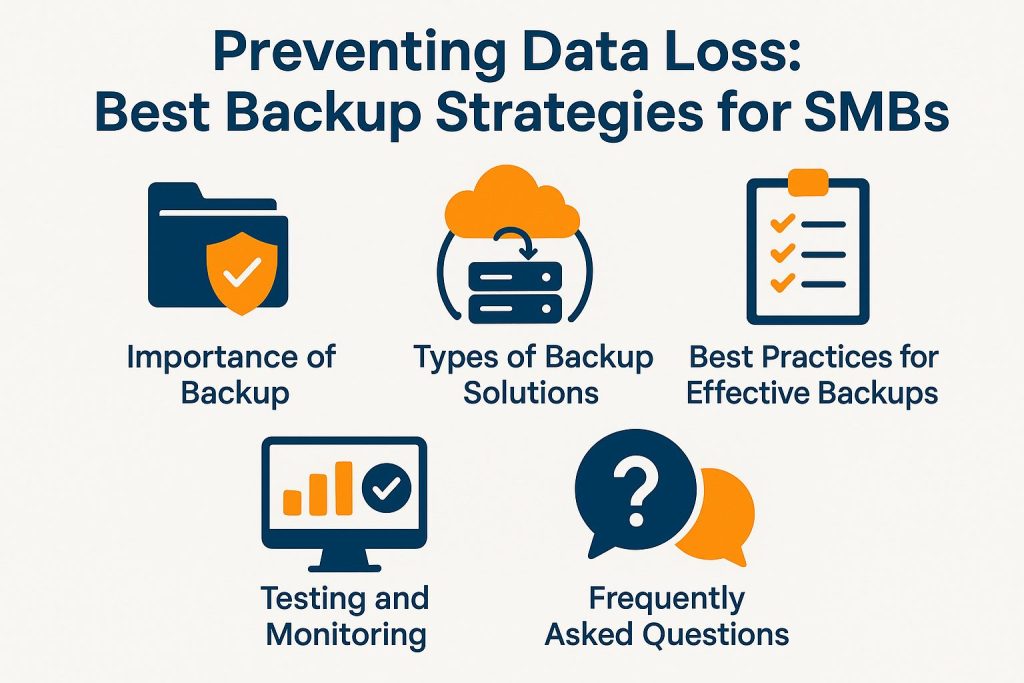Data Protection Strategies for Columbia Businesses: Compliance Requirements in the Capital City

Data protection strategies for Columbia businesses are essential in today’s data-driven economy. With rising cybersecurity threats and strict privacy regulations, businesses must prioritize safeguarding sensitive information to maintain trust and compliance.
This article outlines compliance requirements, key regulations, and best practices to help Columbia businesses protect data effectively and navigate the regulatory landscape.
For additional IT infrastructure insights, read IT Infrastructure for Columbia SC Small Businesses.
Explanation of Data Protection and Its Importance

Data protection includes processes, policies, and technologies that safeguard personal data from unauthorized access and destruction. It ensures compliance with applicable regulations. In today’s digital landscape, especially in Columbia, businesses must understand data protection to maintain customer trust and comply with regulations like GDPR and CCPA.
Effective data protection strategies reduce the risks of data breaches and improve an organization’s cybersecurity. This helps businesses thrive in a data-driven world while meeting legal obligations.
Data protection is important for more than just compliance. It fosters a culture of transparency and trust between organizations and their clients. Companies can reduce vulnerabilities by implementing risk management practices like regular audits and employee training. Staying informed about regulations like HIPAA for health data and PCI DSS for payment information ensures compliance and shows a commitment to customer privacy.
Ultimately, investing in strong data protection measures shows a company’s commitment. It safeguards assets and maintains customer trust.
Compliance Requirements for Columbia Businesses
Businesses in Columbia face a complex framework of compliance requirements to safeguard personal data and uphold privacy rights.
Organizations must understand regulations like GDPR and CCPA to meet legal obligations and build customer trust, which enhances their reputation.
Navigating compliance requires effective data governance strategies, including privacy policies, consent management, and employee training.
These measures ensure that data processing and handling meet established standards.
Overview of Relevant Laws and Regulations
An overview of relevant laws shows the need for strict adherence to data protection practices.
Key laws like GDPR and CCPA create frameworks to safeguard personal data and impose compliance requirements on Columbia businesses. These laws dictate personal data management and grant rights like access controls and data portability, enhancing data privacy.
These regulations stem from public concern about privacy breaches and misuse of personal information. The GDPR, enacted by the EU, sets a global standard for personal data management and influences local regulations, including in Columbia.
Compliance with these frameworks forces businesses to reassess their data governance, improving transparency and accountability. As organizations navigate these legal landscapes, non-compliance can lead to severe consequences like fines and reputational damage, highlighting the need for strong data protection measures.
Best Practices for Data Protection in Columbia

Businesses in Columbia must implement best practices for data protection. This safeguards digital assets and ensures legal compliance.
Organizations should prioritize data loss prevention, encryption, and incident response plans. These strategies reduce risks from data breaches.
Fostering a culture of security awareness through employee training significantly enhances an organization’s ability to protect sensitive information and comply with privacy regulations.
This approach ultimately contributes to ensuring business resilience and continuity.
Tips for Maintaining Compliance and Protecting Data
Businesses in Columbia must take a proactive approach to maintain compliance and protect data. This includes developing privacy policies and implementing strong data security frameworks.
Organizations should conduct regular risk assessments and audits. These help identify vulnerabilities and ensure adherence to regulations like GDPR and CCPA. Establishing clear incident reporting protocols and fostering stakeholder engagement are vital components for enhancing compliance efforts and promoting a culture of data stewardship within the organization.
This approach entails not only adhering to legal requirements but also integrating best practices into daily operations. Business leaders should prioritize data protection training for all employees, ensuring they understand the significance of safeguarding sensitive information.
Utilizing encryption technologies and access controls can significantly mitigate risks associated with unauthorized data access. Furthermore, maintaining an updated incident response plan will streamline actions in the event of a data breach, minimizing damage and preserving public trust.
Ultimately, creating a comprehensive data management strategy that encompasses these elements will enhance compliance. It will also protect sensitive data.
Implementing Data Protection Strategies in Your Business
Implementing effective data protection strategies is essential for businesses in Columbia to ensure continuity and establish robust incident response capabilities.
Organizations should develop a comprehensive data governance framework that includes risk management practices, data classification, and secure data storage solutions.
This strategic approach minimizes data breach risks and aligns with compliance requirements. It fosters customer trust and safeguards personal data throughout its lifecycle.
Steps to Take for Effective Data Protection

For effective data protection, businesses must adopt a structured approach that begins with a comprehensive risk assessment to identify vulnerabilities and potential threats to their data assets.
Following this assessment, implementing data encryption and establishing robust data retention policies are critical steps in safeguarding sensitive information. Additionally, ongoing employee training programs focused on data ethics and security awareness can significantly enhance an organization’s resilience against data breaches and compliance challenges.
To implement these strategies effectively, organizations need to regularly evaluate their risk landscape as technology and threats evolve. This entails conducting audits and utilizing cybersecurity frameworks to ensure that all potential weaknesses are addressed.
Data encryption should encompass not only stored data but also information in transit, employing robust algorithms to protect against unauthorized access. Creating a safety-first culture through employee training can enable staff to recognize phishing attempts and other social engineering tactics.
Regular scenario-based drills solidify this knowledge. They prepare employees to respond effectively to data security incidents.
Summary of Key Points and Final Recommendations
The significance of data protection is paramount, particularly for businesses navigating the regulatory landscape in Columbia. By comprehensively understanding compliance requirements and implementing best practices, organizations can effectively mitigate risks associated with data breaches while fostering customer trust.
These organizations face unique challenges in a digital world. They must protect sensitive information and ensure transparency.
They must stay informed about changing laws on data usage and privacy. This ongoing commitment to compliance not only protects valuable customer information but also enhances the organization’s overall reputation in the marketplace.
Data protection measures are an investment in the organization’s success. They are not just a legal requirement.
Frequently Asked Questions
What are data protection strategies for Columbia businesses?

Columbia businesses should implement policies to protect sensitive information from unauthorized access and use.
What are some common compliance requirements for Columbia businesses?
Columbia businesses must follow federal and state privacy laws like GDPR and CCPA. They should also implement security measures and assess risks regularly.
What steps can Columbia businesses take to ensure compliance with data protection laws?
To ensure compliance, Columbia businesses should create data protection policies, train employees, and regularly update their strategies.
Do all Columbia businesses have the same compliance requirements for data protection?
No, compliance requirements vary by industry, size, and the type of data processed.
What are the consequences of non-compliance with data protection laws in the capital city of Columbia?
Non-compliance can lead to fines, legal issues, harm to reputation, and loss of customer trust. It is important for businesses to prioritize compliance to avoid these consequences.
How can businesses in Columbia stay up to date with changing data protection laws and regulations?
Businesses can stay updated by following industry news, attending events, and consulting data protection experts. It is also important to regularly review and update data protection strategies to ensure compliance with any new laws or regulations.




